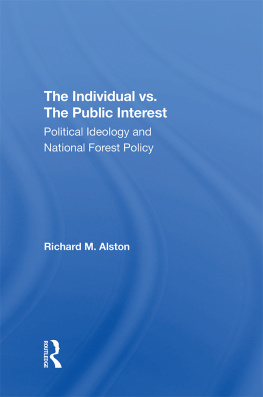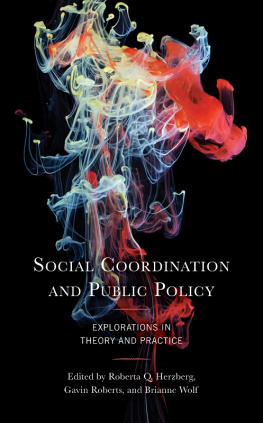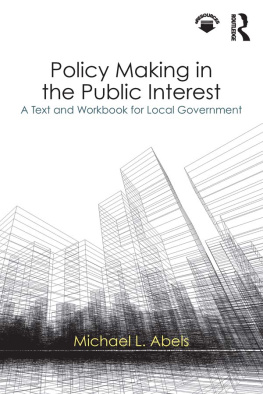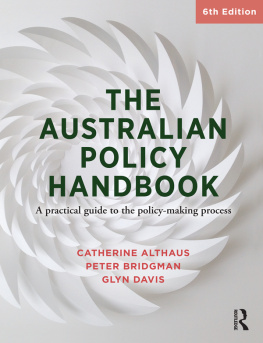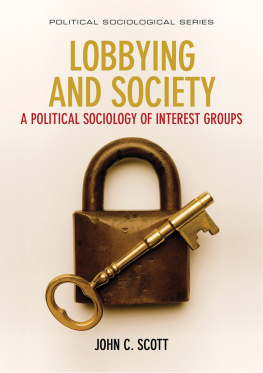The Individual vs. The Public Interest
Westview Replica Editions
The concept of Westview Replica Editions is a response to the continuing crisis in academic and informational publishing. Li brary budgets for books have been severely curtailed. Ever larger portions of general library budgets are being diverted from the purchase of books and used for data banks, computers, micromedia, and other methods of information retrieval. Interlibrary loan structures further reduce the edition sizes required to satisfy the needs of the scholarly community. Economic pressures (particu larly inf lation and high interest rates) on the university presses and the few private scholarly publishing companies have severely limited the capacity of the industry to properly serve the academic and research communities. As a result, many manuscripts dealing with important subjects, often representing the highest level of scholarship, are no longer economically viable publishing projects --or, if accepted for publication, are typically subject to lead times ranging from one to three years.
westview Replica Editions are our practical solution to the problem. We accept a manuscript in camera-ready form, typed according to our specifications, and move it immediately into the production process. As always, the selection criteria include the importance of the subject, the work's contribution to scholarship, and its insight, originality of thought, and excellence of exposi tion. The responsibility for editing and proofreading lies with the author or sponsoring institution. We prepare chapter headings and display pages, file for copyright, and obtain Library of Con gress Cataloging in Publication Data. A detailed manual contains simple instructions for preparing the final typescript, and our editorial staff is always available to answer questions.
The end result is a book printed on acid-free paper and bound in sturdy library-quality softcovers. We manufacture these books ourselves using equipment that does not require a lengthy make ready process and that allows us to publish first editions of 300 to 600 copies and to reprint even smaller quantities as needed. Thus, we can produce Replica Editions quickly and can keep even very specialized books in print as long as there is a demand for them.
About the Book and Author
The Individual vs. The Public Interest: Political Ideology and National Forest Policy
Richard M. Alston
Central to the controversy surrounding U. S. natural resources policy is the conflict between environmentalists and proponents of development. Examining the evolution of the philosophies underlying that conflict, Dr. Alston traces the failure to achieve a unified resources policy to the seemingly incompatible ideological positions held by resource specialists, interest groups, policymakers, econo mists, and foresters. His analysis goes beyond his case study of na ional forest policy to focus on an ancient question basic to policy making in a democratic society: How can government provide a sociopolitical framework that accomodates both individual interests and the need for unity in a collective existence? Only within this broader framework, he argues, is it possible to determine the proper division between private and public resource management or the proper role of government in natural resources planning.
Incorporating a critical evaluation of the development of classical and neoclassical economic theory, this work makes clear the need to strike a balance between a strictly individualistic and an ecological point of view. Dr. Alston illustrates the ideological conflicts that complicate resources planning and explores the possibility of a new ideology capable of accomodating and inte grating differences to meet the complex needs of society.
Dr. Alston is Presidential Distinguished Professor of Economics at Weber State College and author of Forest: Goals and Decisionmaking in the Forest Service.
The Individual vs. The Public Interest
Political Ideology and National Forest Policy
Richard M. Alston
First published 1983 by Westview Press, Inc.
Published 2019 by Routledge
52 Vanderbilt Avenue, New York, NY 10017
2 Park Square, Milton Park, Abingdon, Oxon OX14 4RN
Routledge is an imprint of the Taylor & Francis Group, an informa business
Copyright 1983 Taylor & Francis
All rights reserved. No part of this book may be reprinted or reproduced or utilised in any form or by any electronic, mechanical, or other means, now known or hereafter invented, including photocopying and recording, or in any information storage or retrievla system, without permission in writing from the publishers.
Notice:
Product or corporate names may be trademarks or registered trademarks, and are used only for identification and explanation without intent to infringe.
Library of Congress Catalog Card Number: 82-062871
ISBN 13: 978-0-367-29305-5 (hbk)
The idea for this book originated in the mid-1970s when professional papers by some of the nation's most esteemed economists delivered at annual meetings of the Western Forest Economists and a Symposium on the Economics of Sustained-Yield Forestry held in 1974 at the University of Washington gave evidence of an unusually high degree of ideological cleavage. In some respects, the situation merely indicated that various environmental and industrial interest groups felt that they had been backed into a corner by the events of the previous decade. Thus, the fact that ideology entered discussions of resource management was not, in itself, surprising.
Ideology, a set of ideas about what is and ought to be, is necessary for purposeful choice. Ideology may be compared to ruts in a roadway. But over time the ruts get deep and there is an inertia of ideology that hinders change. All societies require an ideology to guide decisions and to provide a link between the individual and society. The absence of ideology would result in chaos and constant revolution - without a rut, an orderly society would be impossible. To make progress in times of massive social and technical change, however, requires getting out of the ruts and onto a new roadway. The early 1970s represented such a period of new road construction, but the "contractors" seemed to be going in all different directions.
This book is an attempt to show how a potential ideological crisis in our society may be turned into a social opportunity. Although the primary issue addressed is our national forest resource policy, focus is on the evolution of answers to an ancient question: How can society provide a sociopolitical framework that recognizes and makes use of the dual nature of people? How can we embody in our national resource policy the desire for personalization in an individual existence as well as the need for unity in a collective existence? What is the proper dividing line between private and public resource management? What is the role of government in natural resource planning? The evolution of answers to these questions is the concern of this work.
In this book I suggest that until the Forest Service, U.S.D.A., finds an effective way to implement an integrated resource policy capable of bridging the ideological cleavages, it will continue to be pushed back and forth by vested interests. It is an argument against those who believe that there is only one way to look at the world - one correct ideology for all time. The goal is to provide a reference work that will also stimulate readers to challenge existing policy prescriptions, and to engage in productive debate on the role of public and private forestry in the nation's forest management policy.

